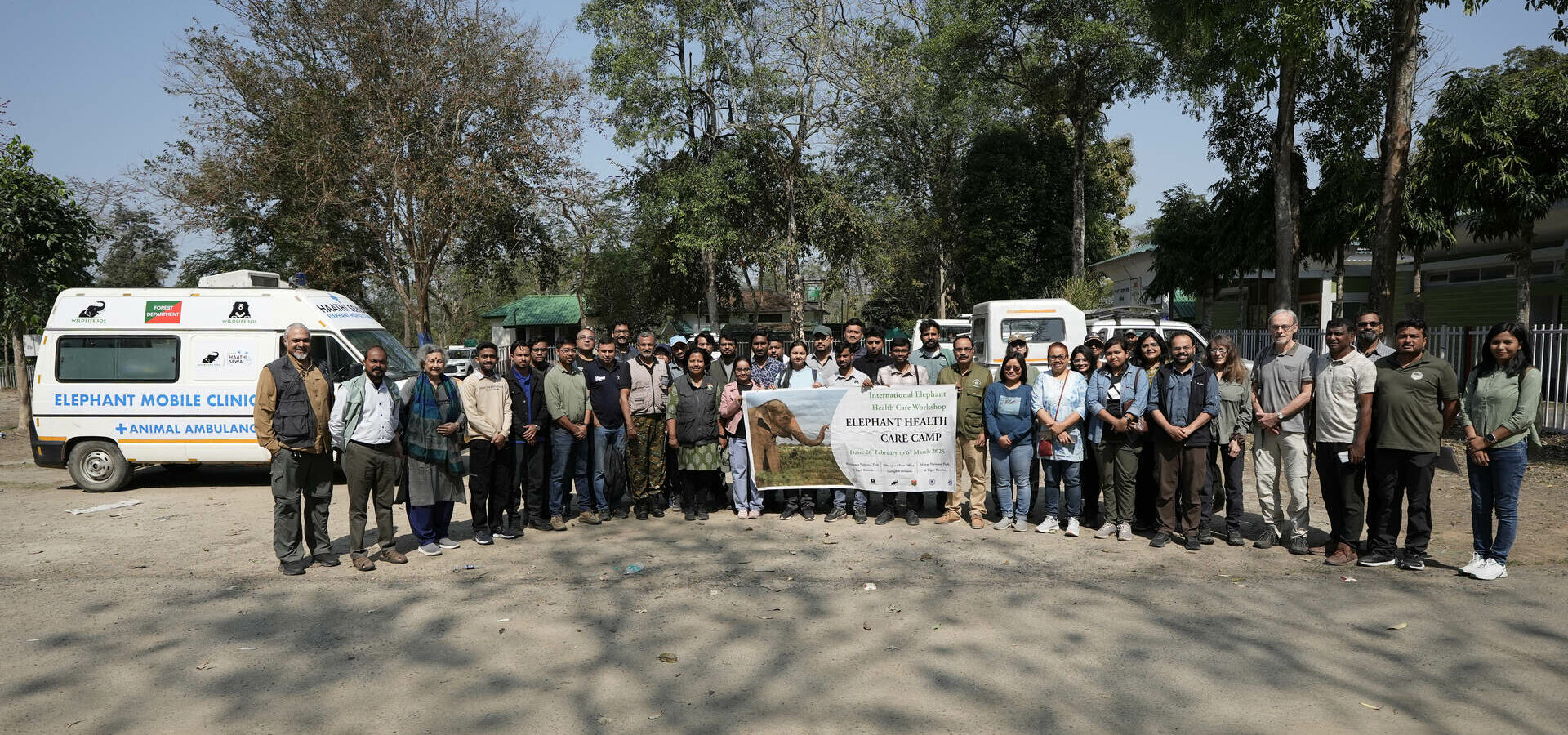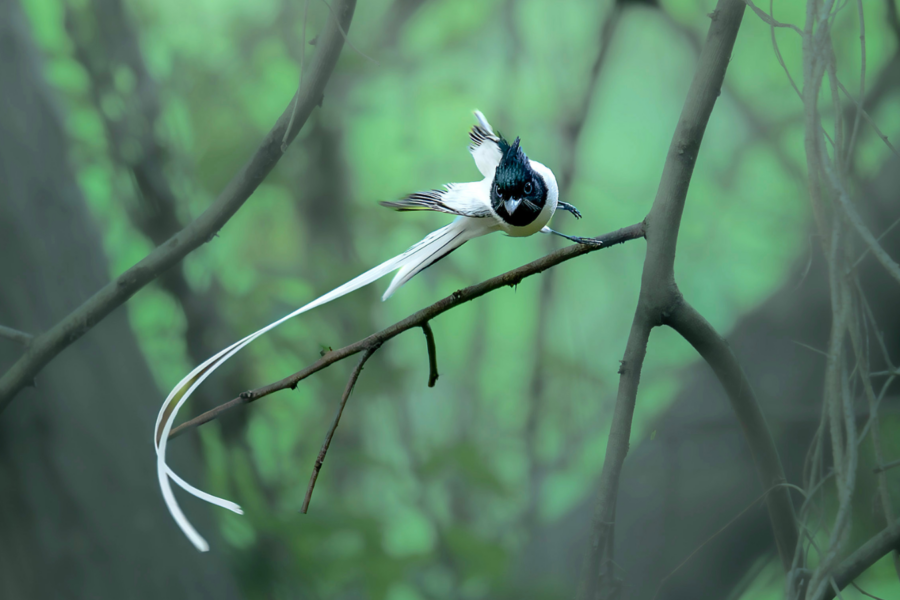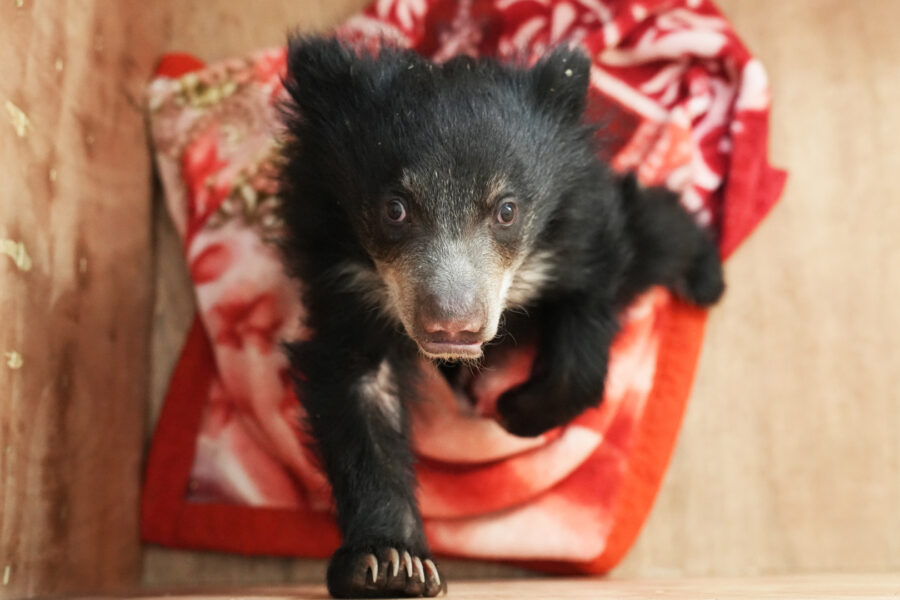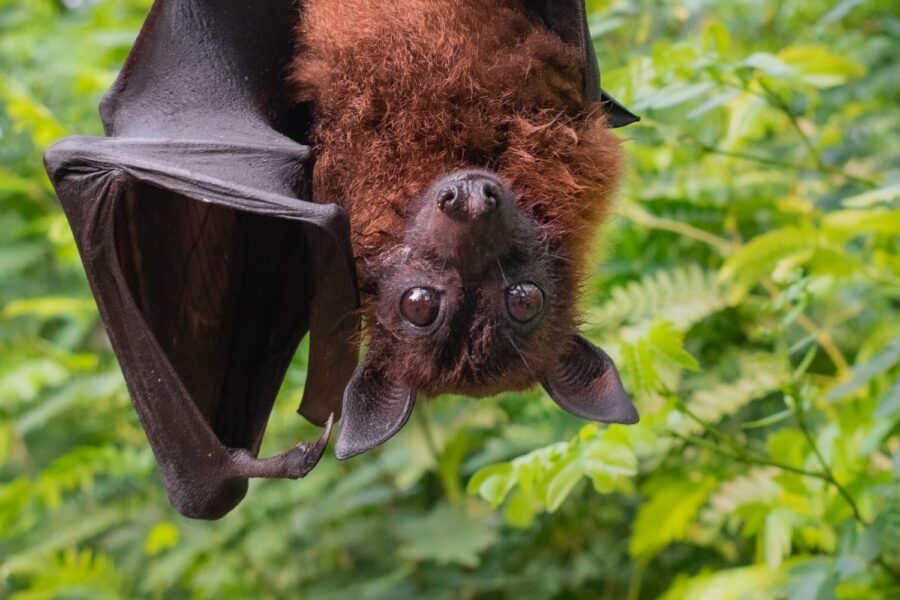In its commitment to expand elephant care and conservation, Wildlife SOS has launched India’s 1st mobile veterinary clinic in Assam to provide immediate medical assistance to elephants in need. The pilot run of Haathi Sewa, Wildlife SOS’s mobile clinic, kicked off at the Elephant Health Care Camp held from February 27 to March 6, 2025, at Assam’s Kaziranga National Park and the Manas National Park. Organised by Wildlife SOS in collaboration with the Assam Forest Department and Assam Animal Husbandry Department, the camp brought together national and international experts to share novel techniques essential for elephant care.
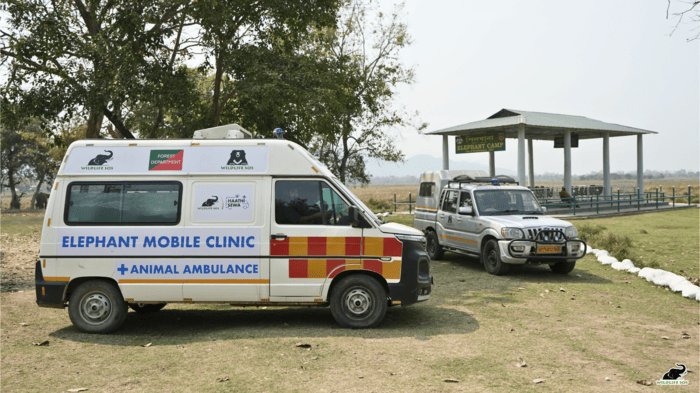
- Haathi Sewa is India’s 1st mobile clinic that will provide on-site treatment to elephants suffering from lameness, foot infections, gastrointestinal diseases, joint swelling and pain, to name a few. [Photo © Wildlife SOS/Mradul Pathak]
Wildlife SOS has been a leading force in elephant rescue and welfare for over a decade, establishing India’s 1st Elephant Conservation and Care Centre and a state-of-the-art elephant hospital. The specially designed veterinary clinic vehicle Haathi Sewa, equipped with medical supplies, diagnostic tools and expert veterinarians, promises to carry forward our aim to conserve elephants in India. Being mobile, the clinic will travel across various locations of the country, providing medical assistance to elephants in need. This initiative will also include generating education and awareness among elephant handlers.
The Elephant Health Care Camp: Laying the Foundation in Kaziranga
The Elephant Health Care Camp was held to provide practical training towards elephant care to government veterinarians and students from College of Veterinary Science, Guwahati. A two-day knowledge-oriented Elephant Health Care Workshop preceded the on-field training at the camp, where new techniques for treatments were shared. The practical application of these techniques at the camp enabled the group to provide medical care to as many as 80 elephants used for anti-poaching efforts and patrolling duties across Kaziranga National Park & Tiger Reserve, Merapani Forest Reserve in Golaghat and Manas National Park & Tiger Reserve.
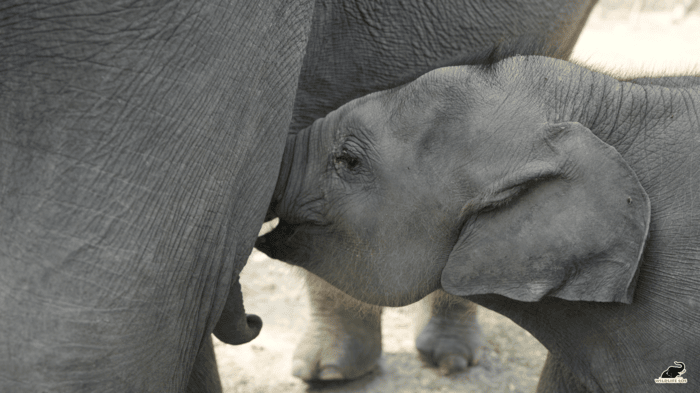
- A total of 80 elephants were medically examined during the course of the Elephant Health Care Camp held in Assam. [Photo © Wildlife SOS/Mradul Pathak]
The camp included the esteemed presence of Dr. Susan K. Mikota, DVM, Co-founder & Director of Veterinary Programs and Research at Elephant Care International, Dr. Willem Schaftenaar, DVM, Research Associate at Elephant Care International, Dr. N. S. Manoharan, Additional Director (retd.) Veterinary Services, Tamil Nadu and Dr. Bhaskar Choudhury, Manager & Head Veterinarian, Wildlife Trust of India. Also present for the respective camps in Kaziranga National Park and Tiger Reserve and Manas Tiger Reserve were Dr. Saurobh Borgohain, Forest Veterinary Officer and Dr. Prabhat Basumatary, Veterinary Surgeon. From Wildlife SOS, our team of experts included Dr. Arun A. Sha, Director – Research & Veterinary Operations, and Veterinary Officers Dr. Rahul Prasad, Dr. Pramod Rajpoot and Dr. Arshvarinder Singh Virk.
The inauguration ceremony for the first part of the health camp took place at Kaziranga National Park with Dr. Sonali Ghosh, IFS, APCCF and Field Director of Kaziranga National Park & Tiger Reserve, lighting the lamp. Wildlife SOS Co-founders Mr. Kartick Satyanarayan and Ms. Geeta Seshamani, addressed the gathering, highlighting the urgent need for elephant well-being in India.
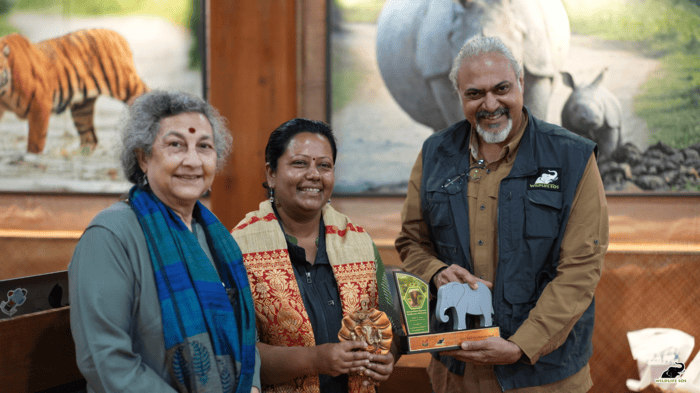
- Wildlife SOS Co-founders Ms. Geeta Seshamani and Mr. Kartick Satyanarayan presented a token of appreciation to Dr. Sonali Ghosh, IFS, APCCF and Field Director of Kaziranga National Park & Tiger Reserve, honouring her dedication to wildlife conservation. [Photo © Wildlife SOS/Mradul Pathak]
Before proceeding towards the treatment site at the Kaziranga National Park, Dr. Arun A. Sha provided an overview of the camp’s objectives to fellow attendees, with emphasis on wildlife etiquette and safety protocols. Dr. N. S. Manoharan brought forward the importance of patience and caution when dealing with animals like captive elephants.
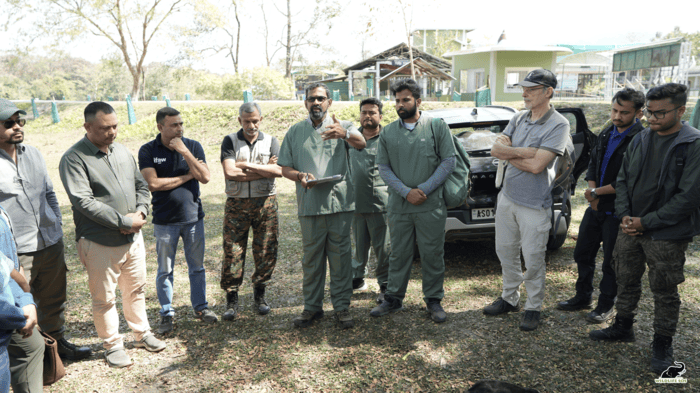
- Dr. Arun A. Sha, Director of Research and Veterinary Sciences at Wildlife SOS, engaged with veterinary students and veterinarians, sharing valuable insights on wildlife care and conservation. [Photo © Wildlife SOS/Mradul Pathak]
Participants were then segregated into small teams, each having a group leader who shared their experience and expertise with their respective teams. As part of the programme, each team was assigned the responsibility of conducting comprehensive health assessments of elephants at the national park.
At first, the teams patiently observed the elephants from a distance — taking notes on its posture, movements and any visible signs of distress. After recording initial observations, the teams carefully approached the elephants for a closer examination.
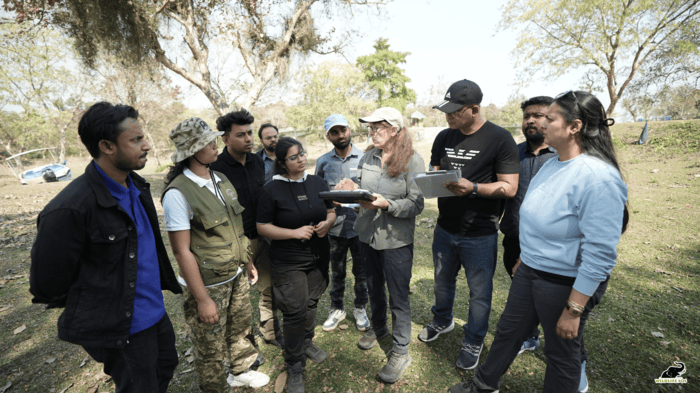
- Renowned expert of elephant care, Dr. Susan K. Mikota delved into elephant treatment strategies with the participants. [Photo © Wildlife SOS/Mradul Pathak]
On the first day of the camp, participants performed a series of analyses, including assessing the gait of the elephants, conducting blood sampling and physical examinations. A total of 12 elephants underwent medical examinations — eight belonging to Kaziranga National Park’s Bagori range, and four from the Mihimukh range — with attention given to abscesses, open wounds, and deworming. These treatments were conducted under the guidance of Dr. Susan K. Mikota, Dr. Willem Schaftenaar, Dr. N. S. Manoharan, Dr. Bhaskar Choudhury, Dr. Arun A. Sha, Dr. Rahul Prasad, Dr. Pramod Rajpoot and Dr. Arshvarinder Singh Virk.

- The professional team obtained blood samples of the elephants as part of the health examinations. [Photo © Wildlife SOS/Mradul Pathak]
On the second and third day, the teams were shuffled to ensure that each participant had the chance to acquire information given by different instructors. In all, 23 elephants, of which 14 were privately owned, were examined in Mihimukh, Agoratoli and Bagori ranges. Their care included treatment of wounds and abscesses, and trimming overgrown nails and cuticles.
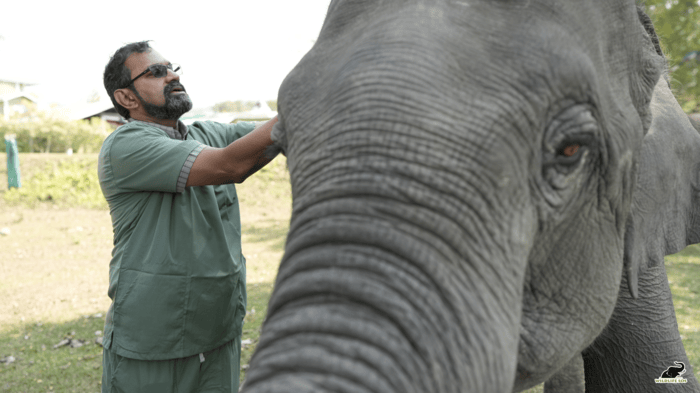
- Dr. Arun A. Sha conducted thorough physical examination to ascertain the elephants’ health and well-being. [Photo © Wildlife SOS/Mradul Pathak]
On day four, participants were split into two teams. The first group travelled to Merapani in Golaghat, Assam, where they examined and treated two elephants and even performed an X-ray on one. The second team continued treating privately owned elephants in Kaziranga. A total of 16 elephants were treated, with cases ranging from abscess management and wound treatment to nail trimming.
Manas National Park: Strengthening Conservation Through Care
With the Kaziranga and Merapani sessions complete, the team moved to Manas National Park on March 3. The inauguration of the Manas camp was led by Dr. C. Ramesh, IFS, CCF and Field Director of Manas National Park & Tiger Reserve, who spoke about the importance of veterinary intervention in conservation efforts.
Over the course of the next two days, extensive health assessments and treatments were given to 29 camp elephants. These elephants are often used for forest patrols.
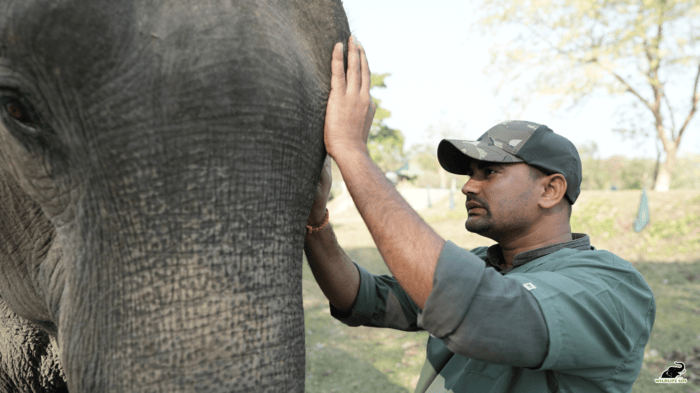
- To ensure early detection and proper care, Wildlife SOS’s Dr. Rahul Prasad examined the elephants’ eyes for infections or cataracts. [Photo © Wildlife SOS/Mradul Pathak]
The rigorous veterinary programme ended on March 5, leaving our guides and participants overwhelmed by the profound experience.
Learnings & Observations: A Turning Point for Elephant Welfare
The Elephant Health Care Camp in Assam was not a mere training exercise, but an important step towards systemic change. Under the guidance of renowned experts, the attendees gained insights into every step taken towards the care and welfare of pachyderms. Before performing treatments, the tip given to be careful and patient was tremendously useful for the teams — their slow and measured pace was helping the elephants grow accustomed to the presence of new people around them, easing their stress and gradually building trust. This also helped the veterinarians observe the behavioural patterns of the elephants. After the check-ups and treatment, bananas and vegetables were offered to the elephants as a reward for the patience that they showed as well while being examined.
It was also important to remember that the elephants at these national parks were not domestic animals, they would roam and feed freely in the wild, keeping their natural behaviour and instincts intact. Coaxing them with treats, kind words and gentle gestures therefore became crucial to convey positive intentions to the elephants, before any check-ups were performed.

- Minor foot pad injuries were observed and treated with medicated spray to ensure the elephant’s comfort while walking. [Photo © Wildlife SOS/Mradul Pathak]
Newfound knowledge of techniques and careful application of them by veterinarians under training led to an unhurried inspection of elephants during the first couple of days at the camp. However, as their competence and confidence rose, the group performed the sensitive procedures effectively, securing the examinations of 80 elephants at the sites!
Wildlife SOS is eager to continue our battle against elephant exploitation. The launch of Haathi Sewa mobile veterinary clinic is an effort to secure the health of these majestic mammals, so that no elephant suffers in silence. Even though its journey on the road is only just getting started, Haathi Sewa is a pathbreaking initiative towards safeguarding elephants in India.
If you come across an elephant in distress or in need of medical attention, reach out to our Elephant Helpline (+91-9971699727) or write to us at info@wildlifesos.org. Your vigilance can make a life-saving difference!
Feature image: Mradul Pathak / Wildlife SOS

